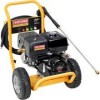Craftsman 3800 Operation Manual - Page 21
Winterstorage, Lohgterm Storage
 |
View all Craftsman 3800 manuals
Add to My Manuals
Save this manual to your list of manuals |
Page 21 highlights
WINTERSTORAGE t¥ NOTICE ou must protect your unit from freezing temperatures. Failureto do so will permanentlydamageyour pumpand renderyour unit inoperable. Freezedamageis not coveredunderwarranty. To protect the unit from freezing temperatures: 1. Follow steps 1-4 in the previous section After Each Use. 2. Use pump saver, available at Sears retail item 6039, to treat pump. This minimizes freeze damageand lubricates pistons and seals. 3. If pump saver is not available, connect a 3-foot section of garden hose to water inlet adapter. Pour RV-antifreeze (antifreeze without alcohol) into hose. Pull recoil handle twice. Disconnect 3-foot hose. 4. Store unit in a clean, dry area. LOHGTERM STORAGE If you do not plan to use the pressure washer for more than 30 days, you must prepare the engine and pump for long term storage. It is important to prevent gum deposits from forming in essential fuel system parts such as the carburetor, fuel filter, fuel hose or tank during storage. Also, experience indicates that alcohol-blended fuels (called gasohol, ethanol or methanol) can attract moisture, which leads to separation and formation of acids during storage. Acidic gas can damagethe fuel system of an engine while in storage. Protect Fuel System Fuel Additive: If adding a fuel additive, fill the fuel tank with fresh fuel. If only partially filled, air in the tank will promote fuel deterioration during storage. Engine and fuel can be stored up to 24 months with additive. * Add fuel additive following manufacturer's instructions. * Make sure you have water supply to pump inlet connected and turned ON. * Run the engine outdoors for 10 minutes to be sure that treated fuel has replacedthe untreated fuel in the carburetor. * Stop engine and move fuel valve lever to "Off" position. DrainingFuel Tank and Carburetor: If fuel additive is not used, remove all fuel from tank and carburetor. o Placean approved fuel container below carburetor and use a funnel to avoid spilling fuel. o Removecarburetor drain bolt (A) and sediment cup (B), then move fuel valve lever to "On" position. * After all fuel has drained into container, reinstall drain bolt and sediment cup. Tighten both securely. 21















